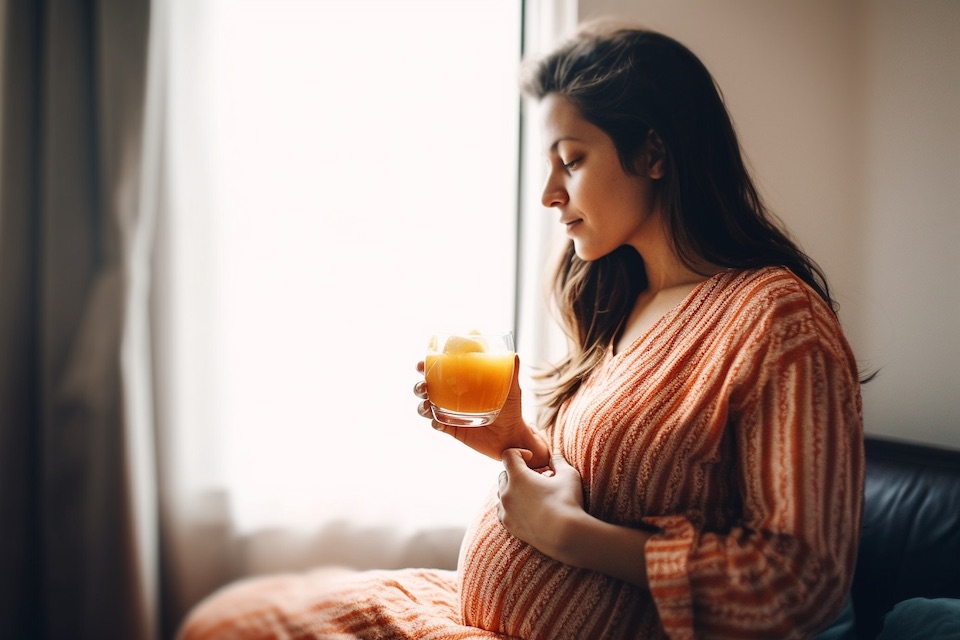What Teas are safe to drink during Pregnancy

If you’re pregnant, you may be wondering if it’s safe to drink tea. The good news is that black, white, and green teas are generally considered safe during pregnancy. However, there are a few things you should keep in mind.
Caffeine Content
Tea contains caffeine, and while it’s safe to consume in moderation, it’s important to be mindful of your caffeine intake during pregnancy. The American College of Obstetricians and Gynecologists (ACOG) advises pregnant women to limit their caffeine intake to less than 200 milligrams per day. A cup of black tea has almost 50 milligrams of caffeine, while a cup of green tea has about 25 milligrams. Be sure to calculate the caffeine content of any tea you consume and keep track of your overall caffeine intake.
Herbal Teas
Herbal teas, on the other hand, can be a bit more complicated. While ginger tea and peppermint tea are generally considered safe during pregnancy, some other herbal teas have been linked to pregnancy complications. It’s important to note that herbal teas are not regulated by the FDA, and there is limited information available on their safety during pregnancy.
Teas that are safe during pregnancy
There are some herbal teas that are generally considered safe to drink during pregnancy. Let’s take a closer look at these teas and their benefits.
Ginger Tea
Ginger tea is commonly used to ease morning sickness during pregnancy, and studies have shown it’s safe and effective for this purpose. However, there is also some evidence that it may negatively affect fetal sex hormones and increase the risk of vaginal bleeding during pregnancy. Therefore, it’s best to discuss the benefits and risks of ginger tea with your healthcare provider before consuming it during pregnancy.
Peppermint Tea
Peppermint tea is often used to calm an upset stomach during pregnancy, and it’s generally considered safe. However, it may not be effective for treating morning sickness. One study found that peppermint oil aromatherapy did not work any better than a placebo to treat nausea and vomiting in the first half of pregnancy. Peppermint tea has also been linked to heartburn, which is already very common in pregnant women.
Green Tea
Green teas, including trendy matcha teas, are considered safe to drink during pregnancy. They’re much lower in caffeine than coffee, with about 25 grams per cup versus 100 grams. However, it’s important to limit your consumption to less than three cups of green tea per day. Green tea is high in catechins, which can prevent your cells from fully absorbing folic acid. Your body needs plenty of folic acid during pregnancy to help prevent neural tube defects.
Black or White Tea
Black and white teas, like green tea, are generally considered safe to drink during pregnancy. However, it’s important not to overdo it, as four cups of black tea will get you to your daily 200 mg caffeine limit. Iced tea is often made from black tea, so keep that in mind as a source of caffeine.
Teas to Avoid During Pregnancy
While some teas, such as ginger tea and peppermint tea, are generally considered safe, there are others that should be avoided altogether. Here’s what you need to know about teas to avoid during pregnancy.
Chamomile Tea
Chamomile tea is a popular herbal tea that is often used to help with relaxation and sleep. However, during pregnancy, it’s best to avoid this tea altogether. Studies have shown that drinking chamomile tea regularly may increase the risk of miscarriage, preterm labor, or low birth weight.
Other Herbal Teas to Avoid
In addition to chamomile tea, there are several other herbal teas that should be avoided during pregnancy. These include:
- Alfalfa
- Black cohosh
- Blue cohosh
- Comfrey
- Dong quai
- Ephedra (called ma huang in traditional Chinese medicine and banned in the United States since 2004)
- European mistletoe
- Goldenseal
- Hibiscus
- Horehound
- Kava
- Labrador
- Lemongrass
- Licorice root
- Mugwort
- Nettle leaf (also called stinging nettle leaf)
- Passion flower
- Pennyroyal
- Rosemary
- Sage
- Sassafras
- Saw palmetto
- Vetiver
- Yarrow
- Yerba mate
It’s important to note that this isn’t a complete list, and there may be other herbal teas that should be avoided during pregnancy. Always check with your healthcare provider before consuming any herbal tea during pregnancy.
Why Some Herbal Teas Are Unsafe During Pregnancy
Herbal teas are not regulated by the FDA, which means there is limited information available on their safety during pregnancy. Some herbal teas have been associated with pregnancy complications, such as preterm labor, miscarriage, or low birth weight. Others may contain chemicals that can harm the developing fetus.
When brewing tea, the brewing process concentrates the chemicals in the herbs, making them more potent than when used in food. This is why it’s generally safe to eat food containing some of the herbs listed above, such as rosemary and sage, in small amounts, but not to consume them as teas.
Before you consume any herbal tea during pregnancy, be sure to talk to your healthcare provider to make sure it’s safe for you and your baby. Your healthcare provider can help you determine which teas are safe to drink during pregnancy and how much is safe to consume.
What About Caffeinated Teas?
While some caffeinated teas, such as black, white, and green teas, are generally considered safe during pregnancy, it’s important to be mindful of their caffeine content. The American College of Obstetricians and Gynecologists recommends that pregnant women consume no more than 200 milligrams of caffeine per day, which is about one 12-ounce cup of coffee. Be sure to check the caffeine content of any tea before consuming it, and limit your overall caffeine intake during pregnancy.
In conclusion, when it comes to herbal teas during pregnancy, it’s important to err on the side of caution. While some herbal teas, such as ginger tea and peppermint tea, are generally considered safe, others should be avoided altogether. Always check with your healthcare provider before consuming any herbal tea during pregnancy, and limit your overall caffeine intake as well. By being mindful of what you consume, you can help ensure a safe and healthy pregnancy.
Other Drinks to Avoid
While tea is generally considered safe during pregnancy, there are other drinks you should avoid. Alcohol should be avoided altogether, and it’s important to limit your overall caffeine intake. Energy drinks and sugary drinks should also be avoided.
Lisa M
As a talented Black writer and mother, I have found my calling in the world of parenting. I understand firsthand the unique challenges and joys of raising children as a person of color in a complex and diverse world. With my degree in English and years of experience as a freelance writer, I have developed a distinct writing voice that speaks directly to the heart of my readers. My approach to writing is warm and compassionate, and I offer practical advice and support to parents navigating the ups and downs of parenthood. As a Black woman and mother, my writing is informed by my experiences, and I aim to create a space for underrepresented voices in the parenting world. Whether I'm sharing tips on self-care or exploring the complex intersections of race and parenting, my writing is always informative, engaging, and deeply personal. I am dedicated to empowering and uplifting other parents on their parenting journey, and my writing reflects this passion and commitment.




1 Comment